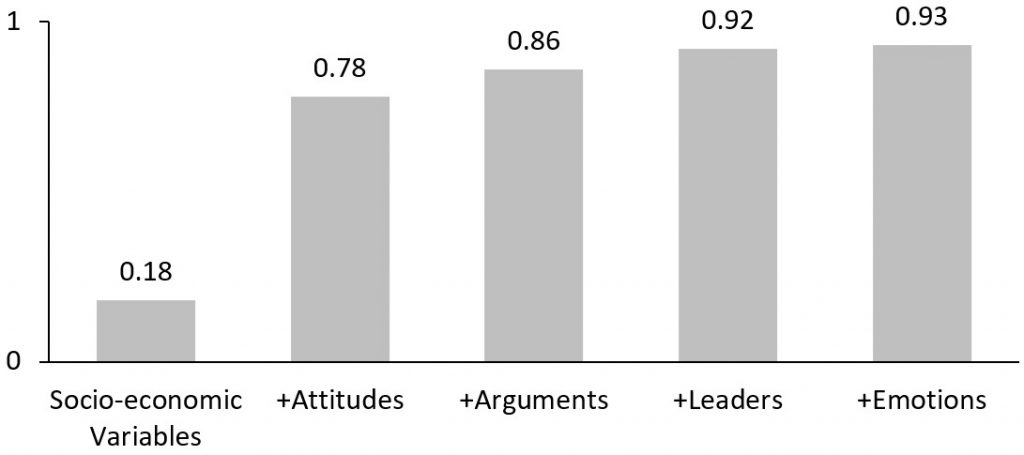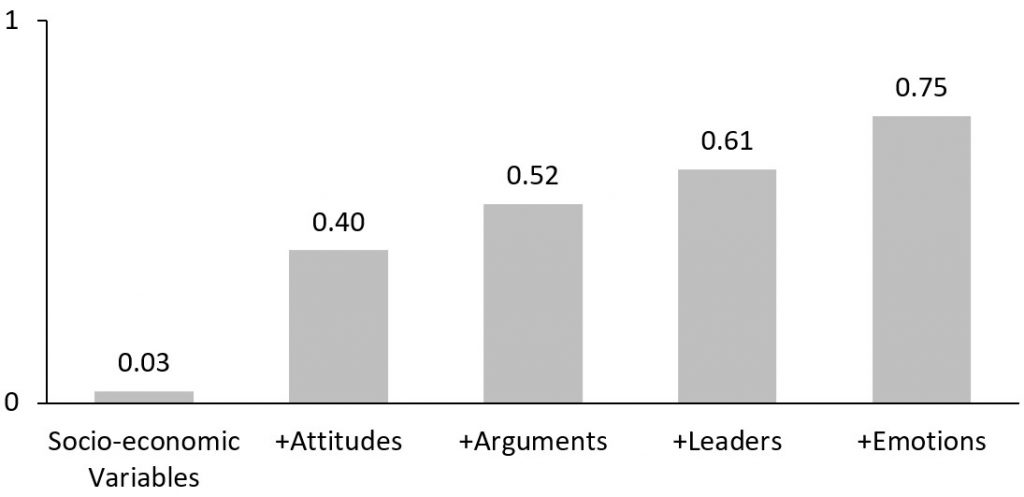Prior to the Brexit referendum in 2016, many observers expected that floating voters would swing toward Remain due to the perceived risks and uncertainty associated with leaving the European Union. Drawing on a new book, Ece Özlem Atikcan, Richard Nadeau and Éric Bélanger explain how the Leave campaign managed to reframe the risks associated with Brexit and win the referendum.
The UK’s decision to leave the European Union in 2016 defied the well-established idea that voters don’t like change or uncertainty. It has been perceived, both in policy and academic circles, as a major shock. But why did the British public vote to take such an important economic risk?
In a new book, we bring a new angle to this question by paying special attention to referendum politics and by placing the Brexit case in the bigger picture of the EU and Scottish independence referendums. To do so, we present a much-needed multi-method and comparative analysis of how the Brexit campaign contributed to the outcome.
Political scientists have been baffled by the Brexit result. However, it looks less surprising when four crucial, but neglected factors are highlighted. Most studies treat the Brexit referendum as a single case, overlooking the peculiar dynamics of referendum politics, ignoring the power of certain kinds of political arguments, and lacking a systematic analysis with a multi-method approach.
Our core argument is as follows. The opinion polls showed a critically split public in the run-up to the referendum, and the main expectation was that status quo bias would shift enough voters to produce a tight result in favour of remaining in the EU. But the opposite happened. Knowing how the Brexit referendum compares to previous referendums is crucial in understanding this unusual, anti-status-quo outcome.
In the Brexit vote, as in any referendum, the risk assessment depended primarily on the campaign strategies of the two main campaigns. These strategies helped voters understand the risks involved in the choice. Voting against the status quo for an uncertain future outside the EU was made easier for a critical section of society because the pro-Leave arguments strongly suggested that remaining in the EU would be at least as risky as leaving it. These voters chose to ‘Take Back Control’ of their country. Strikingly, the Leave campaign’s strategy also had an impact on the degree to which Remain voters accepted the referendum result. By effectively ‘de-risking’ the Brexit decision, the pro-Leave arguments convinced a group of moderate Remain voters that the concept of Brexit could potentially be palatable.
We make this argument by adopting a multi-method approach, showing how the campaign contributed to the outcome via three kinds of data: over 150 interviews with campaigners in Scotland and England and across Europe, media content analysis of the news media, and a detailed post-referendum survey involving survey experiments.
As a first step, we compare the Brexit campaign to other referendums. At first glance, the outcome of the Brexit referendum cannot be understood within existing explanations of referendums elsewhere in the world. In previous EU referendums, whenever an anti-EU vote was presented as having drastic economic consequences or potentially leading to an exit from the EU, a majority tended to vote in favour of European integration. In independence referendums as well, economic costs consistently trump national identity, as a majority of voters worry about the economic costs of a departure from the host state.
The strategies employed in the Brexit referendum were broadly in line with the strategies used in these previous referendums, but the Leave side’s specific framing choices saved them from key mistakes that others have often made. In comparison to other EU referendums, the Leave side benefitted from the advantages of being on the anti-EU side while successfully avoiding the typical challenge of being seen as extremist.
In comparison to the Scottish referendum, on the other hand, the Leave side faced a much weaker opponent and also successfully avoided the usual questions on their exit plan’s economic viability. As opposed to the Scottish government, the Leave campaign chose not to present a concrete ‘exit plan’. The success of this strategy was demonstrated by the level of criticism the ‘exit deals’ of Prime Ministers May and Johnson received during the actual Brexit negotiations.
In a second step, we study the impact of these campaign arguments on voting behaviour, and more specifically their differential impact on early and late deciders. Analyses from our survey data first indicate that campaign arguments had an important effect on support for Brexit beyond the impact associated with more long-term determinants such as socioeconomic characteristics and general attitudes toward the EU. While the latter set of determinants did provide the Leave camp with a significant reservoir of support, notably due to the long-term UK tradition of scapegoating the EU, the campaign arguments also clearly mattered.
Our analyses show that the core Remain campaign argument, about the possibility that there would be loss of jobs, trade and investment in a UK outside the EU, had traction among the electorate. But so did the two central Leave campaign arguments, which claimed that the level of immigration to the UK would likely decrease with Brexit and that the NHS would be better protected in a UK outside the EU. This helped neutralise the Remain camp’s main argument about the economic costs of Brexit and gave the Leave camp a slight edge. Furthermore, resentment toward bureaucracy in Brussels and arguments for regaining control of national borders seem to have infused the Leave campaign with a higher emotional charge that ultimately helped it carry the day.
Another of our key public opinion findings is that the campaign-related factors played a more prominent role in the voting decisions of late deciders, who constituted a sizable portion (22%) of the electorate. As can be seen in Figures 1 and 2, the contribution of these factors to the explanation of the voting decision was much more important for those voters who waited until the last week of the campaign or even until the referendum day to make up their mind.
Figure 1: Percentage of explained variance (pseudo-R-Squared) with different models for early deciders
Note: Compiled by the authors.
Figure 2: Percentage of explained variance (pseudo-R-Squared) with different models for late deciders
Note: Compiled by the authors.
In studying campaign argumentation strategies, we also uncover the core mechanism behind post-truth politics. By showing that the strength of an argument is not its empirical validity but its public appeal, our analysis illustrates why this dynamic happens, how it happened in the Brexit case, and how it compares to similar dynamics in other parts of the world. The Leave side’s strategies, in line with contemporary politics on closed borders, played a remarkable role in framing the choice. Our findings are therefore highly generalisable to referendums and elections around the world, having significant implications for all kinds of international regimes and states’ faith and participation in them.
For more information, see the authors’ accompanying book, Framing Risky Choices (McGill-Queen’s University Press, 2020)
Note: This article gives the views of the authors, not the position of EUROPP – European Politics and Policy or the London School of Economics. Banner image credit: Matt Brown (CC BY 2.0). Featured image credit: Mark Ramsay (CC BY-ND 2.0)






Sorry, but this reads liker another “outsider” looking at Leavers with bemusement.
The authors claim that
“loss of jobs, trade and investment in a UK outside the EU, had traction among the electorate”
No doubt “project Fear” did have some traction – with passionate Remainers….
……but surely this is closer to the truth.
“By showing that the strength of an argument is not its empirical validity but its public appeal,”
Project Fear had insufficient “public appeal”. It was disbelieved by a majority.
Lastly, the phrase;
“The Leave side’s strategies, in line with contemporary politics on closed borders,”
….undermines academic neutrality.
Controlling borders (Take Back Control) does NOT equal “closed borders”.
“closed borders” was an exclusively Remain claim.
ANY objective analysis of the Leave campaign should have noted the message about being open to trade and relationships with the World – not one limited to (obsessed with ?) the EU.
And they still don’t “get it” !
1/10